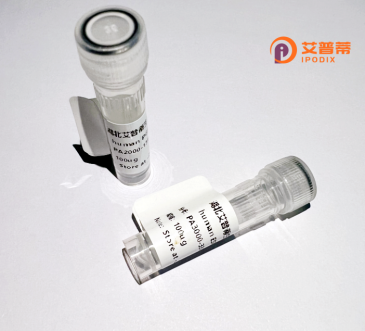
| 纯度 | >90%SDS-PAGE. |
| 种属 | Human |
| 靶点 | SLC34A1 |
| Uniprot No | Q06495 |
| 内毒素 | < 0.01EU/μg |
| 表达宿主 | E.coli |
| 表达区间 | 1-639 aa |
| 活性数据 | MLSYGERLGSPAVSPLPVRGGHVMRGTAFAYVPSPQVLHRIPGTSAYAFPSLGPVALAEHTCPCGEVLERHEPLPAKLALEEEQKPESRLVPKLRQAGAMLLKVPLMLTFLYLFVCSLDMLSSAFQLAGGKVAGDIFKDNAILSNPVAGLVVGILVTVLVQSSSTSTSIIVSMVSSGLLEVSSAIPIIMGSNIGTSVTNTIVALMQAGDRTDFRRAFAGATVHDCFNWLSVLVLLPLEAATGYLHHITRLVVASFNIHGGRDAPDLLKIITEPFTKLIIQLDESVITSIATGDESLRNHSLIQIWCHPDSLQAPTSMSRAEANSSQTLGNATMEKCNHIFVDTGLPDLAVGLILLAGALVLLCTCLILLVKMLNSLLKGQVAKVIQKVINTDFPAPFTWVTGYFAMVVGASMTFVVQSSSVFTSAITPLIGLGVISIERAYPLTLGSNIGTTTTAILAALASPREKLSSAFQIALCHFFFNISGILLWYPVPCTRLPIRMAKALGKRTAKYRWFAVLYLLVCFLLLPSLVFGISMAGWQVMVGVGTPFGALLAFVVLINVLQSRSPGHLPKWLQTWDFLPRWMHSLKPLDHLITRATLCCARPEPRSPPLPPRVFLEELPPATPSPRLALPAHHNATRL |
| 分子量 | 95.3 kDa |
| 蛋白标签 | GST-tag at N-terminal |
| 缓冲液 | PBS, pH7.4, containing 0.01% SKL, 1mM DTT, 5% Trehalose and Proclin300. |
| 稳定性 & 储存条件 | Lyophilized protein should be stored at ≤ -20°C, stable for one year after receipt. Reconstituted protein solution can be stored at 2-8°C for 2-7 days. Aliquots of reconstituted samples are stable at ≤ -20°C for 3 months. |
| 复溶 | Always centrifuge tubes before opening.Do not mix by vortex or pipetting. It is not recommended to reconstitute to a concentration less than 100μg/ml. Dissolve the lyophilized protein in distilled water. Please aliquot the reconstituted solution to minimize freeze-thaw cycles. |
以下是关于重组人SLC34A1(NaPi-IIa)蛋白的3篇文献示例:
1. **文献名称**:*"Functional characterization of recombinant human NaPi-IIa/SLC34A1 in HEK293 cells"*
**作者**:Forster, I.C., et al.
**摘要**:研究利用HEK293细胞异源表达重组人SLC34A1.验证其磷酸盐转运活性及钠依赖性;揭示了胞内段调控区域对转运功能的调节作用,并分析了pH及激素(如PTH)对其活性的影响。
2. **文献名称**:*"Structural insights into sodium-driven phosphate transport by human NaPi-IIa"*
**作者**:Wagner, C.A., et al.
**摘要**:通过冷冻电镜技术解析SLC34A1的三维结构,阐明了其钠离子和磷酸盐结合位点的分子机制,提出该蛋白通过构象变化实现跨膜转运的模型。
3. **文献名称**:*"Cloning and expression of human renal sodium-phosphate transporter SLC34A1: Implications for hypophosphatemic disorders"*
**作者**:Miyamoto, K., et al.
**摘要**:首次报道SLC34A1的cDNA克隆及重组表达,证实其参与肾小管磷酸盐重吸收,并发现部分突变体在表达后功能受损,与遗传性低磷血症相关。
如需具体文献,建议通过PubMed或Web of Science搜索标题或作者以获取全文。部分年份或细节可能需核实。
SLC34A1. also known as NaPi-IIa, is a sodium-dependent phosphate transporter predominantly expressed in the proximal tubules of the kidney. It plays a critical role in phosphate homeostasis by mediating apical reabsorption of inorganic phosphate (Pi) from the glomerular filtrate. This transmembrane protein, encoded by the SLC34A1 gene, utilizes the sodium gradient to transport Pi into renal cells, ensuring systemic balance of phosphate—an essential nutrient for bone formation, energy metabolism, and cellular signaling. Dysregulation of SLC34A1 function is linked to disorders such as hypophosphatemia, nephrolithiasis, and chronic kidney disease. Mutations in SLC34A1 can cause autosomal recessive Fanconi renotubular syndrome, characterized by phosphate wasting and rickets.
Recombinant human SLC34A1 protein is produced using expression systems like HEK293 or insect cells to study its structural and functional properties. It enables researchers to investigate transport mechanisms, screen modulators, or develop therapeutic strategies targeting phosphate-related pathologies. Recent advancements in cryo-EM and crystallography have provided insights into its 3D conformation and sodium/Pi coordination sites. Recombinant variants also aid in diagnosing genetic mutations or evaluating drug toxicity impacting renal phosphate handling. Research on SLC34A1 is pivotal for understanding renal physiology and developing treatments for metabolic bone diseases.
×